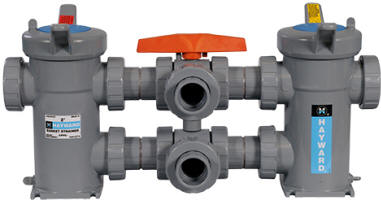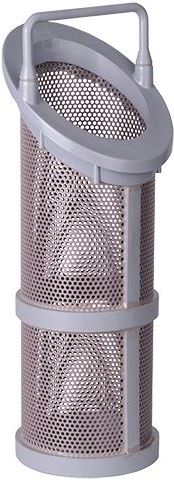Hayward Duplex Strainers
Duplex strainers made of PVC, CPVC and Clear Eastar®

Plastic
duplex strainers are used for continuous removal of
particulate from liquids or environments that are
aggressive to alloy strainers and are designed to be
installed within non-alloy piping systems.

Our
duplex strainers are available in
PVC,
CPVC and
Eastar (clear)
materials with the three-way flow diverting valves
matching the strainer body material; with exception
of the Clear Eastar material where PVC valves are
used. The three-way valves used are the TW
series as described at our valve website:
Three Way Ball Valves.
Both the strainer and valve connections feature the
true-union design, simplifying installation and
maintenance.
EPDM or
FKM
elastomers are used for the chamber covers,
connections and valve seals.
The standard strainer screen has 1/32" perforations
and is
made from the same material as the strainer body.
Additional perforations are available and may be
substituted for no additional cost. it is also
possible to order stainless steel screens and mesh
lined screens for an additional cost.
One frequently asked question is:
Are the
strainers schedule 40 or 80? The answer
is "neither" because that terminology
is used to describe the uniform wall thickness of piping
and since these are molded products having varying wall
thicknesses, they cannot have a specific "schedule"
assigned to them. What you need to refer to is the rated
pressure by temperature chart to make sure that your
application falls within the limits of the strainer
material chosen. Each duplex strainer page has links to
the catalog pages and the pressure/temperature charts.
Other significant aspects to consider include:
-
Never use plastic strainers for compressible fluids such as air or nitrogen.
-
The maximum fluid velocity should not exceed 5-8 FPS and our sizing calculators use 5 FPS as the design standard.
-
Your piping system should be independently supported; the strainer is not designed to support piping nor should piping support the strainer. The strainer should be mounted to a firm surface and the piping upstream and downstream of the strainer should be independently supported.
-
It's critical to review your pressure limitations for your fluid temperature and reduce potential Water Hammer situation accordingly.
If you intend to install a
plastic strainer within an alloy piping system it is
recommended that you install at least 10 pipe diameters
of plastic piping upstream and downstream of the
strainer to help account for differences in thermal
expansion rates of metal and plastic, transmittal of
pipe vibration and pipe loading forces. Connecting
plastic strainers directly with metal piping can
potentially damage the strainer.
When in-doubt, simply call us or better yet,
fill-out our application based inquiry form and
we'll assist you with the proper selection.



